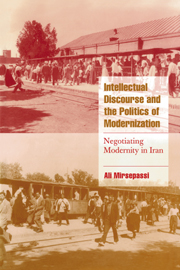
-
Select format
-
- Publisher:
- Cambridge University Press
- Publication date:
- 06 October 2009
- 12 October 2000
- ISBN:
- 9780511489242
- 9780521650007
- 9780521659970
- Dimensions:
- (228 x 152 mm)
- Weight & Pages:
- 0.515kg, 244 Pages
- Dimensions:
- (228 x 152 mm)
- Weight & Pages:
- 0.415kg, 244 Pages
- Subjects:
- Sociology of Race and Ethnicity, Middle East Studies, Area Studies, Sociology: General Interest, Sociology
You may already have access via personal or institutional login- Subjects:
- Sociology of Race and Ethnicity, Middle East Studies, Area Studies, Sociology: General Interest, Sociology
Book description
In this thought-provoking study, Ali Mirsepassi explores the concept of modernity, exposing the Eurocentric prejudices and hostility to non-Western culture that have characterized its development. Focusing on the Iranian experience of modernity, he charts its political and intellectual history and develops a new interpretation of Islamic Fundamentalism through the detailed analysis of the ideas of key Islamic intellectuals. The author argues that the Iranian Revolution was not a simple clash between modernity and tradition but an attempt to accommodate modernity within a sense of authentic Islamic identity, culture and historical experience. He concludes by assessing the future of secularism and democracy in the Middle East in general, and in Iran in particular. A significant contribution to the literature on modernity, social change and Islamic Studies, this book will be essential reading for scholars and students of social theory and change, Middle Eastern Studies, Cultural Studies and many related areas.
Reviews
"...an excellent addition to the on-going debates in sociology and the Middle East." Contemporary Sociology
Contents
Metrics
Altmetric attention score
Full text views
Full text views help Loading metrics...
Loading metrics...
* Views captured on Cambridge Core between #date#. This data will be updated every 24 hours.
Usage data cannot currently be displayed.
Accessibility standard: Unknown
Why this information is here
This section outlines the accessibility features of this content - including support for screen readers, full keyboard navigation and high-contrast display options. This may not be relevant for you.
Accessibility Information
Accessibility compliance for the PDF of this book is currently unknown and may be updated in the future.


